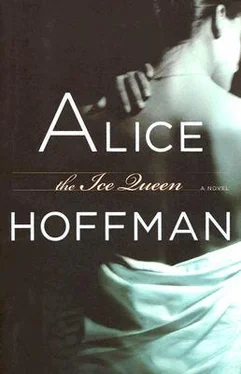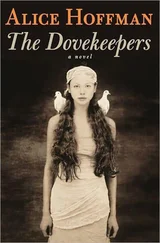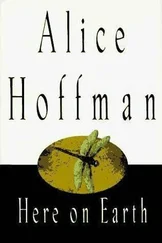Had I? I suppose I had. Those exercises that made me want to cry, dragging my left side along. It felt almost normal now, only not quite; there was still a metallic feeling along my ribs, around my heart. You couldn’t see it, but it was there, just as surely as Renny’s hands were filled with strands of gold.
I withdrew everything in my account except for a hundred dollars.
“Big purchase?” the teller asked me. Everybody knew everybody in this town. Even me.
I smiled. Very big. I said I wanted cash because I was buying a used car. An old Corvette.
“I’m jealous,” the teller said.
I had fifteen thousand dollars left from the sale of my grandmother’s house, but it fit neatly in my backpack.
“It’s red,” I said.
“The best,” the teller said to me.
I walked to the parking lot. There was my Honda. The one with the good tires, the safe tires my brother had chosen before we left New Jersey. When I got home, Lazarus was still asleep. I understood. He didn’t want to wake up. I sat in a chair. Maybe I cried. I loved him in a way that was over. A way that was the beginning of something. The sort of love that opened you up for more.
When it was late afternoon I got onto the couch beside him. I whispered that it was time for him to go.
I won’t, he said.
You will, I thought. You want to.
This would be the moment I would never let go of, even though it caused me the greatest pain. When I was old, when I couldn’t walk or talk or see, I would still have this.
He assumed I was going with him. We’d leave the cat outside and someone would find her, care for her. Wasn’t that the way it went? Cats made their own homes, found their own way. I could send my brother a note, mail it from the road, not until we got where we were going, all those places, Venice and Paris, everywhere I’d ever wanted to go.
He packed the cash into his duffel bag. I watched his hands. I couldn’t look at anything else.
This was what it was. The ruin of it. The depth of it. Have it once and you can have it again. That’s the riddle. That’s the truth.
***
Lazarus took a shower, drank iced coffee, had a bowl of cold tomato soup. It was humid outside and when the day was over, the night was sticky hot. It was late when we left and the sky was dark. We drove to Jacksonville, on the side roads. I knew the way there. A place where no one would recognize us. We drove for an hour, then two. It seemed that we were going somewhere together. His hand on me as I drove. I could feel him, but it wasn’t enough. He should have known I wasn’t going with him: he should have noticed I left the cat in the house, something I would have never done if I hadn’t been coming back. I wasn’t somebody who left that way.
I took him to the bus station. All he needed to do was find someone who could change the date of birth on his passport and then he’d be Seth Jones. But for now, he needed to get out of Florida. I bought one ticket for the next bus; it was headed to Atlanta.
We sat at the bus station together till five in the morning. That was when the bus was leaving. And here’s the thing: We didn’t look at each other. We didn’t beg each other for anything. We’d already given each other all that we had.
“So, this is the way it ends,” he said.
People around us were sleeping. They had their own stories; they weren’t listening to us. There was a child in a red sweater in her mother’s arms. There was the sun through the dirty foggy window.
Not at all, I thought.
This is the way it begins .
Chapter Seven
Brother and Sister
We knew it was getting closer because my brother was dreaming of butterflies. Even in the daytime, he was dreaming. At first the meteorology society had refused to accept his paper, “Chaos Theory and Fairy Tales.” I had to stay with Ned overnight while Nina flew up to speak to the head of the society. When she came back she reported that the decision had been changed.
By the time Ned went to Washington DC to deliver his paper, he was in a wheelchair; the moderator had to lower the microphone and ask for complete silence so that Ned’s reedy voice could be heard. At the heart of his paper was the notion that fairy tales relieved us of our need for order and allowed us impossible, irrational desires. Magic was real, that was his thesis. This thesis was at the very center of chaos theory — if the tiniest of actions reverberated throughout the universe in invisible and unexpected ways, changing the weather and the climate, then anything was possible. The girl who sleeps for a hundred years does so because of a single choice to thread a needle. The golden ball that falls down the well rattles the world, changing everything. The bird that drops a feather, the butterfly that moves its wings, all of it drifts across the universe, through the woods, to the other side of the mountain. The dust you breathe in was once breathed out. The person you are, the weather around you, all of it a spell you can’t understand or explain.
He got a standing ovation, Nina told me. We were setting up the nursery together now that they were back from DC, painting a watercolor mural on the wall. Nina was supposed to take it easy — she had preeclampsia, high blood pressure brought on by pregnancy — but she painted flowers and trees in the baby’s room after she came home from classes. Sometimes Ned would watch us, and then we’d turn around, ready to joke with him, and he’d be asleep. We kept painting. Nina was at work on the sun. My job was the moon.
Sometimes my brother cried out in his sleep, sometimes he called out.
“Butterflies,” Nina said. “In his dreams.”
Nina had dark circles under her eyes. Now, when my brother went to all his medical appointments, they let him have whatever he needed to kill the pain. That should be a good thing, but it’s not, because then you know you’re nearing the end.
I offered to help out full-time, and Nina let me. They had closed the library, just as Frances had suspected. I had no job and was collecting unemployment benefits. I didn’t think about what I would do when my money ran out. I could always get a job as a cashier at Acres’ Hardware. People would still ask me questions there. Reference me a saw, a hammer, a can of paint, an apron, an anvil. I would learn it all, recite it by heart.
But for now, I was available. I did the food shopping and the laundry. I felt useful for once. I began to paint butterflies on the wall. I began to dream of them, too. I thought of Lazarus, surely halfway across the world by now. I dreamed of him as well, but only occasionally. I was too busy for that now.
My brother had started to age, the way ill people do. He was a hundred years old when he slept in his wheelchair; he was breaking our hearts. When he napped, Nina and I sat out on the grass, even when it was hot. There was a hedge of boxwood. We sat in its shade. Nina cried; I watched her. Once, I went into the kitchen to fetch some ice water for Nina and found my brother at the window.
“Do you think we all have something we dream of doing?” my brother said. At that moment he was perfectly alert.
I sat down at the table. “Such as?”
“The thousands of monarch butterflies. In migration. The thousands of changes. All chaos. All one moment. That’s what I’ve always wanted to see. I want to see that.”
He sounded upset. I’d never heard my brother want something quite so deeply, so much. This was far beyond his desire to see the old man in Jacksonville. That was a lark; this was the heart of the matter. The end of his life.
We hadn’t heard, but Nina had come in, looking for me. She was still crying, but she looked like stone, the way she had when I spied her in the yard. There were bits of grass on her clothes. She smelled like boxwood and evergreen. She was stronger than you’d think. She simply didn’t give away who she was to just anyone. She probably started to plan it out then. When she heard his dream.
Читать дальше












